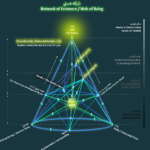Science, Religion, Reason Retaliation
This section is a bit controversial. It is a prelude to the next. Before heading to the main point, it’s better to mention something about the relation of religion and science. Dating back to the medieval time, one finds a big clash between the two. The church believed the Earth was flat, while Galileo came with a spherical shape for it. Which one was right? The powerful church crucified him for standing against the religiosity. It was a taboo. People didn’t really know what to do and to what incline. Eventually there appeared a big gap between religion and science with an incline towards science resulting atheism and agnosticism today. But the truth is that, there is not any discord between the two if the domain of each is defined truly. Science, we know impromptu, is ruling with trial and error. It has a specific paradigm which is not about to be meddled in other models and paradigms. It is not even powerful enough to respond to all errors and solve all problems. Therefore, man needs another dominion too, namely, religion. A terrain on which all crucial needs of man are met and resided. Here one might ask; then what is the role of science? And if they contradict, which one has more priority?
To respond to this question we shall say that there are two dimensions in our world; the physical and metaphysical dimensions.[1] The rules of each are in a very wide range. They are even connected to each other and have a high coherence. There are ways to know these rules, otherwise the goal of the universe and creation is undermined.[2] One part of the laws are recognized by experience namely the science, the other with reason, and a larger part of that through divine revelation. Each of them, also, are in grades and ranks; the definite one and the assumptive one. So we have definite and assumptive reason, definite and assumptive science, definite and indefinite or assumptive religious law. Hence having 6 types of sources of knowing multiplied by 6 we face 36 types of contradiction. Now in most cases they don’t contradict, but in some they do. No matter how religious or scientific or rational you are if you want to be religious, meanwhile reasonable and at the same time science-friendly person you need to know the most common contradictions and how to solve them, otherwise you are called a maverick, a dogmatic, a fanatic or an unbeliever, an infidel, or an atheist in its worst sense.
The most common types of contradictions are as follows:
- Definite religious law[3] vs definite rational law[4]
- Definite religious law vs an indefinite rational law
- Definite religious law vs a definite scientific law
- Definite religious law vs an indefinite scientific law
The first one is rather impossible because the pure reason never opposes the divine law unless one side is lacking definiteness. But if, one in hundred, it happened you ought to give way to the definite rational law, because it is all evident. As an example if a messenger of God tells you it is light while you see it is dark then you guess that the messenger means something different and he means a connotative meaning by that word. Then I must understand his indirect meaning or purpose. Or if I read in the scripture that God has hands and feet while the true philosophical mind, based on logical and ontological laws, tells me He doesn’t, He doesn’t. In this case I need to find the indirect meaning of His word.
As for the second contradiction, we stand for the religious law for it is definite. And for the rational law we need to find the deficiencies therein in order to correct it and make it compatible with the religion. Here, science may also accelerate the process of accordance.
Considering the third seemingly discordance which is more common in the west since renaissance it is to be said that if it is an exact and true knowledge obtained by science then it is about to be given way otherwise the religious law is about to be having the highest priority. The methodology of science is testing and examining for proving facts. And it is whether in the physical realm or in the metaphysical one. In physics it is authentic if it results in exactness. But in Meta physical it’s too hard to say it is competent enough to respond and meet the metaphysical arena. There are some arguments for this:
-
- The physical means lack in proving the metaphysical beings as the eye or even a microscope is unable to spot even some physical entities, with all improvements in science, let alone the metaphysical entities.
-
- If science is qualified enough and has proved its competency so far, why hasn’t solved the problems of humanity yet. The most crucial needs of man are still unsolved with the improved science; the matter of God as the cause of creation, the life after death, the purpose for creation, the matter of evil, psychological disorders, social and political problem, terrorism, killings, and many other issues not only unsolved but also harsher than the past.
- Life is short and it has a purpose to lead man to perfection. It is crystal clear that science, alone, is unable to meet this purpose.
With respect to the fourth contradiction, definitely the former speaks much louder than the latter.
Other types of contradictions are whether adequately clear or are scarcely concerned.
The solution for this opposition, however, is not eradication of religion or science nor secularization. The solution is rather reconciliation. There is no other way out. Man is in dire need to both and to divine laws more because it is the religion which has been crucified since renaissance. Once the religious leader was going extreme belittling the reason and science, the other time the mere reason and science. The man has had enough of this separation. Now it is the time of friendship. The only path is the path of conjunction giving each its due defining a civilized system combined with religious, rational and scientific laws inside to help humanity and to solve his issue.
[1]. For further information about meta physical realm of the universe refer to The Meta World of this book.
[2]. Refer to the previous section.
[3]. By this we mean a law that is obtained by a religious scholar known in Muslim world as a jurisprudent who has a full knowledge in different branches of religion principles such as: linguistics, semantics, theology, jurisprudence, logic, philosophy, Knowledge of the Holy Book and traditions of the Apostles, and methods of how to interpret them.
[4]. By this we mean both the evident or the prima facie and the theoretical or philosophical law.








